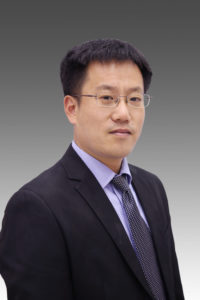 Xian-Zheng Yuan is a professor of environmental engineering in the School of Environmental Science & Engineering at Shandong University. He received his PhD from Qingdao Institute of BioEnergy & Bioprocess Technology (QIBEBT), Chinese Academy of Sciences (CAS), MS from Research Center for Eco-Environmental Science, CAS, and BS from Shandong University. Before joining Shandong University, he worked in QIBEBT, CAS. His research group focus on anaerobic technology (e.g., chemical and molecular insights for emerging pollutants biodegradation) and environmental nanotechnology (e.g., micro- and nano-plastics in aquatic and terrestrial ecosystems).
Xian-Zheng Yuan is a professor of environmental engineering in the School of Environmental Science & Engineering at Shandong University. He received his PhD from Qingdao Institute of BioEnergy & Bioprocess Technology (QIBEBT), Chinese Academy of Sciences (CAS), MS from Research Center for Eco-Environmental Science, CAS, and BS from Shandong University. Before joining Shandong University, he worked in QIBEBT, CAS. His research group focus on anaerobic technology (e.g., chemical and molecular insights for emerging pollutants biodegradation) and environmental nanotechnology (e.g., micro- and nano-plastics in aquatic and terrestrial ecosystems).
Read Professor Yuan’s Emerging Investigator article “Inhibition and recovery of anaerobic granular sludge performance in response to short-term polystyrene nanoparticle exposure” and read more about him in the interview below:
Your recent Emerging Investigator Series paper focuses on the inhibition and recovery of anaerobic granular sludge performance in response to short-term polystyrene nanoparticle exposure. How has your research evolved from your first article to this most recent article?
As a graduate student, I published my first article on internal phosphorus control in the shallow lakes. I have shifted my research from drinking water to wastewater treatment during my doctoral studies. My current research is mainly on anaerobic biotechnology (e.g., chemical and molecular insights for emerging pollutants biodegradation) and environmental nanotechnology (e.g., micro- and nano-plastics in aquatic and terrestrial ecosystems). So this Emerging Investigator Series paper focused on the response of anaerobic microbial community in wastewater to nanoplastics.
What aspect of your work are you most excited about at the moment?
Our self-developed on-line analyzer for total volatile fatty acids and early-warning system of anaerobic reactors have been equipped in a treatment plant of brewery wastewater.
In your opinion, what are the most important questions to be asked/answered in this field of research?
Anaerobic digestion, as a mature technology, has been widely used in the wastewater treatment plants for primary and secondary sludge stabilization and energy recovery. However, the fate of emerging pollutants during anaerobic digestion of sludge is largely unknown. Hence, we need to understand the behavior of emerging pollutants from chemical and molecular insights.
What do you find most challenging about your research?
The anaerobic digestion of sludge is a complex system. The response of microbial community for the emerging pollutants is the most challenging and most charming.
In which upcoming conferences or events may our readers meet you?
I will be attending the IWA Anaerobic Digestion Conference (Delft, Netherlands, 23th -27th, June, 2019).
How do you spend your spare time?
I enjoy spending my spare time with my wife and our six-year-old boy as much as possible. We enjoy outdoor activities as a family.
Which profession would you choose if you were not a scientist?
I might be a baker. The smell of freshly baked bread is out of this world.
Can you share one piece of career-related advice or wisdom with other early career scientists?
Curiosity, passion, communication and cooperation.










